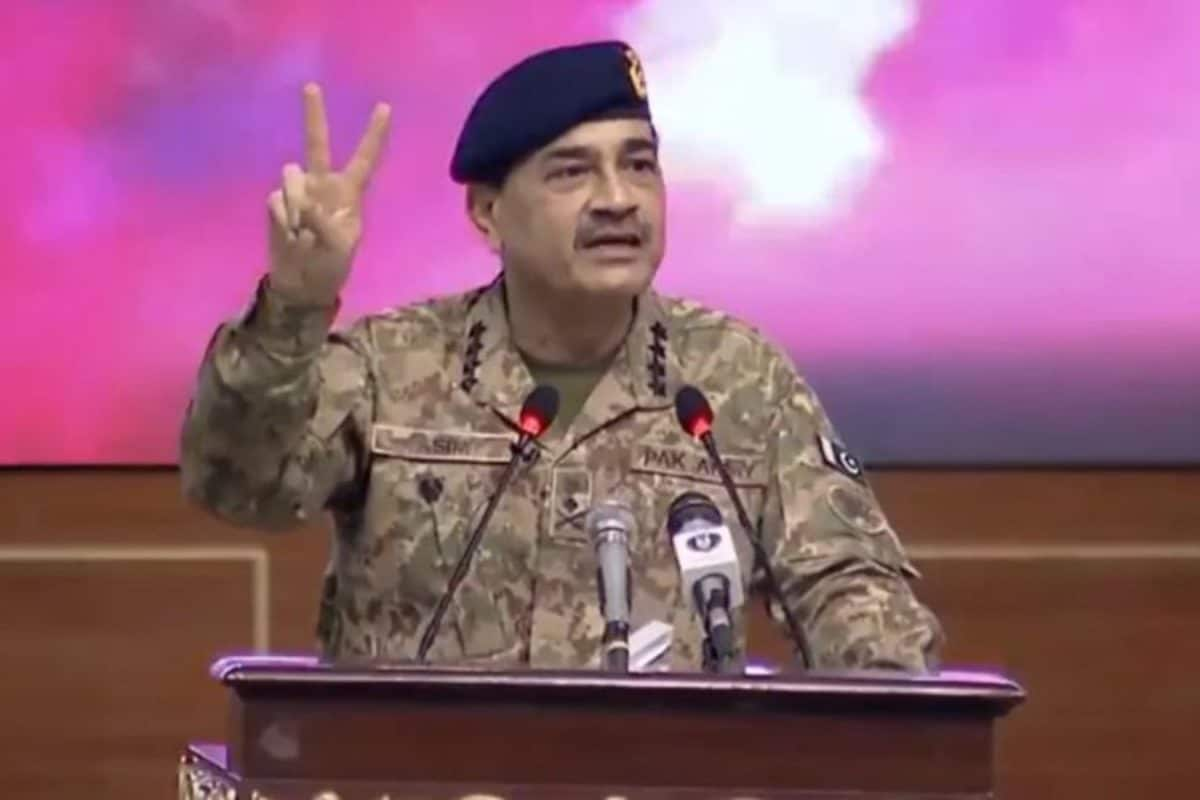General Munir's rant should serve as a reality check for those in India who push for peace talks with Pakistan It’s quite likely that you’ve seen a video of Pakistan Army chief Asim Munir’s crazed anti-India rant. It went viral. Decked out in his military uniform, every bit the tin pot general, Munir belched a rant against India that would befit a common troll.
Munir said, “Our forefathers believed that we were different from Hindus in every possible aspect of life. Our religion is different. Our customs are different.

Our traditions are different. Our thoughts are different. Our ambitions are different.
.. That was the foundation of the two-Nation Theory.
It was laid on the belief that we are two nations, not one." Munir’s ravings drew protests here in India. Primarily because, as many said, he’s talking “bs".
A majority of Pakistan’s Muslims are from pre-partition India. They were actually converted from Hinduism and Sikhism. A majority of Pakistanis thus share our culture.
Pakistan’s national language, the one that Munir speaks, is called Urdu. This language is a cultural, special purpose vehicle that is spoken in India. Urdu was born and finessed on the streets of cities in 12th century Northwest India.
Its words are still used to deliver Bollywood punchlines, and it is the staple of ghazals and qawwalis. It’s almost certain that General Munir also knows that he’s talking “bs." So then, why make a stark raving idiot of yourself before the world? First, Pakistan is a country that was founded on being a land for, of, by Muslims.
The land of the pure or “Pak". It’s a nation that exists only as a reaction to “Hindu" India. No other nation has been formed in the past seven or more decades purely as a reaction to some other country.
For a few years now, Islam has not been the glue its founders hoped it would be. Balochi Pakistanis, Pashtuni Pakistanis, Sindhi Pakistanis are all straining at the leash to break away. The generals are worried.
It’s happened before when Bengali Pakistanis broke away in 1971 and formed their own nation called Bangladesh. So General Munir is now going to some pretty desperate lengths to remind Pakistanis of all stripes why they came together to found Pakistan. To the younger generation of Indians, born in a pluralistic India that celebrates its diversity, it is almost impossible to imagine Indian Muslims as a separate race.
Indeed, many Indians, including several Muslims, tweeted back to General Munir, calling him a hate-mongering xenophobe. But let me tell you that the two-nation theory was very real. The founding fathers General Munir was quoting weren’t fictitious figures.
There were, before August 15, 1947, millions of Muslims in India who didn’t want to live among Hindus. Till the Brits were around, Hindus and Muslims were happy to collaborate with one another to gain independence but when Muslims realised that their goal was near at hand, they began worrying about being “dominated by Hindus in a Hindu majority free India". Some very famous Indian Muslims, who have institutions named after them, or are celebrated litterateurs, were soon making a case for a separate nation for Indian Muslims on the sub-continent by partitioning India.
Poet Iqbal, of the “saare jahan se achha" fame was one of the prominent ones. Iqbal said, “I have no hesitation in declaring that if the principle that the Indian Muslim is entitled to full and free development on the lines of his own culture and tradition in his Indian home-lands is recognised as the basis of a permanent communal settlement, he will be ready to stake his all for the freedom of India." A Muslim Congress party leader called M.
A. Jinnah saw an opportunity. In 1920, Jinnah quit the Congress to join the All India Muslim League and turned it into a movement for the Partition of India along Hindu and Muslim lines.
Despite the fact that Jinnah wasn’t a devout Muslim, he smoked, drank, and ate pork, his appeal was spectacularly popular. Just before quitting India, the British held elections so that a government of Indians could be in place to take over after they exited. Powered by ordinary Muslims, sold on the idea that they were separate from Hindus, the Muslim League won many seats.
In fact, more Muslims, in every part of India, voted for the Muslim League than the Congress. This was a bitter reality check as the Congress party was staunchly against Partition or the creation of Pakistan. It’s a different matter that many Indian Muslims who voted for Partition couldn’t settle there.
Many reconciled with the idea of living in what they called a “Hindu majority" India. Could a desperate General Munir be directing his poisonous thoughts to Indian Muslims in the hope of implanting the seeds of secession? Or reminding them, all these decades after, of their duty to their faith? Nothing can be put past the perverse military-intelligence establishment in Pakistan. While it is preposterous to think that Indian Muslims who have lived in India for nearly eight decades after Partition would still consider themselves a separate race, General Munir’s rant should serve as a reality check for those in India who push for peace talks with Pakistan.
If the Army that runs Pakistan harbours such ill will towards India and all things Indian, peace talks will inevitably turn into a dialogue of the deaf. General Munir’s diatribe should also prompt introspection within another class of Indian Muslims – clerics and politicians – who are campaigning to preserve “shariat compliant" personal codes. Do they realise that yearning for “special status" or religion-based exceptions in a secular India only plays into the hands of Muslim supremacists and two-nation advocates like Pakistan’s army chief?.
Politics

Opinion | General Munir's Rant Is A Verbal Cross-Border Strike. Indians Stay Alert

General Munir's rant should serve as a reality check for those in India who push for peace talks with Pakistan















